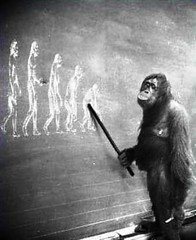by Mike Bendzela

An Ape meets a Holy Man who is visiting a zoo. The Holy Man has made a career of debasing such animals as the Ape, and now the Ape sees an opportunity to preempt him. She is a fabulist and must act quickly.
“The animals are trying to tell you something.”
“I don’t speak animal,” the Holy Man sneers.
The Ape ignores him and continues: “Once upon a time–”
Some monitor lizards–opposed to the increasing presence of cobras in their midst–held a public meeting to air their concerns. “Fellow Lizards!” one outspoken lizard said to those gathered. “The cobras intend to surround us, defeat us, and take our land. But they won’t stop there; we all know how snakes are. If we don’t do something quickly, they will swallow all our young!” Inflamed by this speech, the lizards quickly mobilized. They sought out the snakes, surrounded them, and defeated them. But, for reasons no one has been able to fathom, the triumphant lizards then devoured every snake egg they could find.
“Indeed,” the Holy Man says, “someone is always plotting against you.”
“Would you like to hear the moral?”
“I’m all ears.”
The most depraved acts may be committed in the name of preventing depravity.
“In other words,” the Holy Man says, “you can’t make an omelet without breaking a few eggs.”
The Ape tries again:
A Titanoboa from a past epoch gazed at a crocodilian with something like adoration. The snake had convinced itself that engaging the croc would be to the benefit of all: Fishes and turtles would be free of a tormentor, the snake would eat well, and the prey itself would gain a purpose in life. As the snake slung its giant coils around the crocodile and began to squeeze, it whispered reassurances that all would be well hereafter.
“When would that be?” the crocodile inquired. But its brainstem shut down from lack of blood before it could discern an answer.
“Ah. Show kindness and mercy to your enemy, to the very end,” the Holy Man concludes. “That is the moral.”
The Ape corrects him:
The instinct for self-acquittal clings to all that we do.
The Holy Man just rolls his eyes.
The Ape takes a different tack this time, appealing directly to human vanity:
As if it weren’t bad enough that the Landowner had clapped members of a neighboring tribe into the yoke, he pitted them against one another in contests of endurance until they collapsed into heaps at the end of the day. Then he had them sing songs of praise to him, tunes he had written himself, and prance about in their bonds like work horses. They were paid for their entertainments with the very fodder they had been enslaved to harvest.
One of the Landowner’s sons marveled at this arrangement. “How can you stand to witness, let alone celebrate, the suffering you cause?”
“They are but apes,” his father said. “They don’t feel as we do.”
The Holy Man nods approvingly. “Listen to your father, kid.”
“This has a moral, too–” the Ape starts.
“Of course it does,” the Holy Man snaps.
The Ape goes on:
Savagery commences from ignorance of one’s own animal nature.
“Just imagine what horrors animals would be capable of if they weren’t so ignorant!”
He’s utterly clueless! the Ape thinks. She must scramble. “Bear with me. This next one’s kind of long.”
Some Ants living under a certain wood stump were incapable of realizing they didn’t know anything of the outside world. Their antennae were exquisitely tuned to find just the airs of their own colony agreeable. The edicts that wafted down from their Queen filled them with an illusion of knowledge and reason. This motivated them to action, which felt to them just like free will.
The Termites in a nearby mound had evolved a disposition almost identical to that of the Ants: They imagined that the notions radiating from Royal Headquarters issued from their own heads, and they fancied themselves informed about the world.
It was revealed to the Ants that the rotten stump under which they nested was the Holy Motherland. But this same stump had been vouchsafed to the Termites instead as a delectable corpse.
For the Ants, it was an abomination to think of their home being consumed; whereas for the Termites it was a sacrilege to waste a corpse! After all, this stump was a gift from On High. They both believed this.
So, when a troop of Termites arrived at the stump to consume what was rightfully theirs, the Ants were waiting for them—with open jaws that snapped like traps.
The Holy Man yawns. “Okay. I give up.”
“Do I need to spell it out for you?”
“I’ve been patient. Reel it out.”
A sense of belonging involves elevating group appetite over reason.
“Indeed,” the Holy Man says. “How else do we win our holy wars?”
“One more, then I’m through.”
A mother harbor seal was swimming with its pup back to its favorite rock for a rest, when a tiger shark drew a bead on the young one. As the shark launched forward, its nictitating membranes lifted and, like shutters, veiled its eyes from the blood and thrashing flippers.
The mother seal fluttered helplessly around the shark in a cloud of her pup’s blood, wailing: “Have you no shame, parting a mother from her child?”
“I saw nothing of the sort,” the shark said, disappearing into the deep.
The Holy Man seems to be nodding off.
“Are you listening?”
The Holy Man’s eyes snap open. “You talking to me?”
Listlessly, the Ape delivers the moral.
Denial rather protects our self-image as we bull through life.
The Holy Man has had his fill of animals. “Your bestial tales are very entertaining,” he says. “But we men have our own Scriptures.”
Note
The original fables may be found here.
Image
“Evolution – From man to ape” by Erdonzello is marked with Public Domain Mark 1.0.
